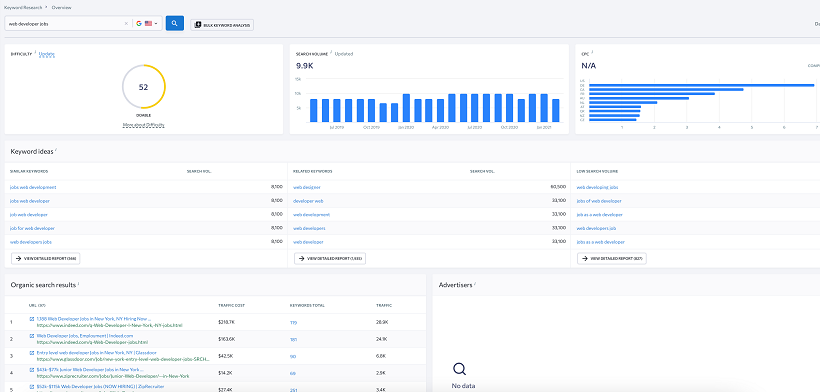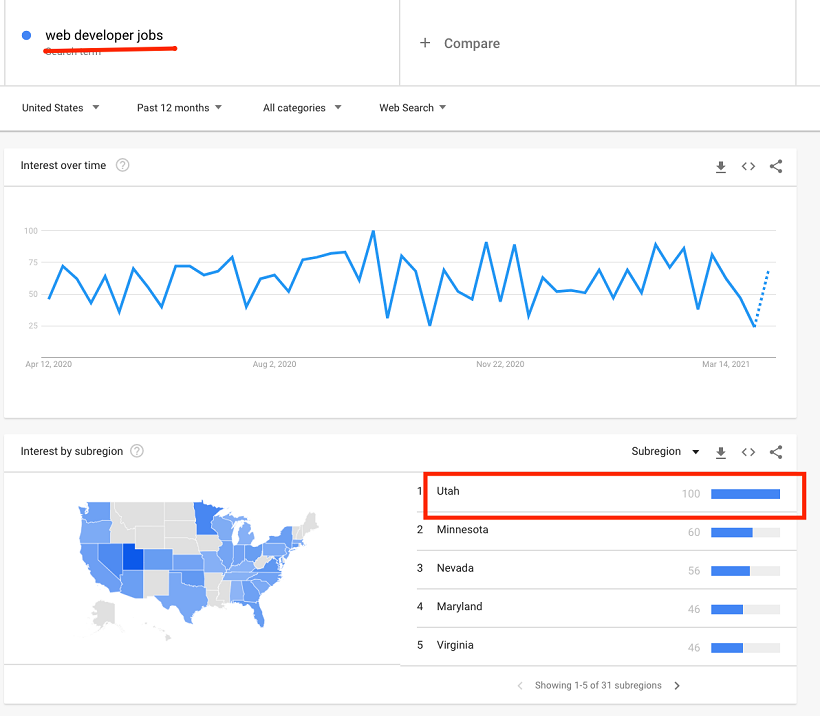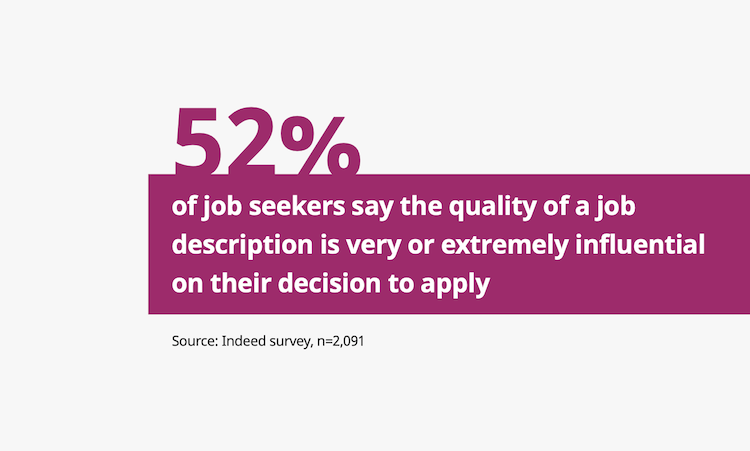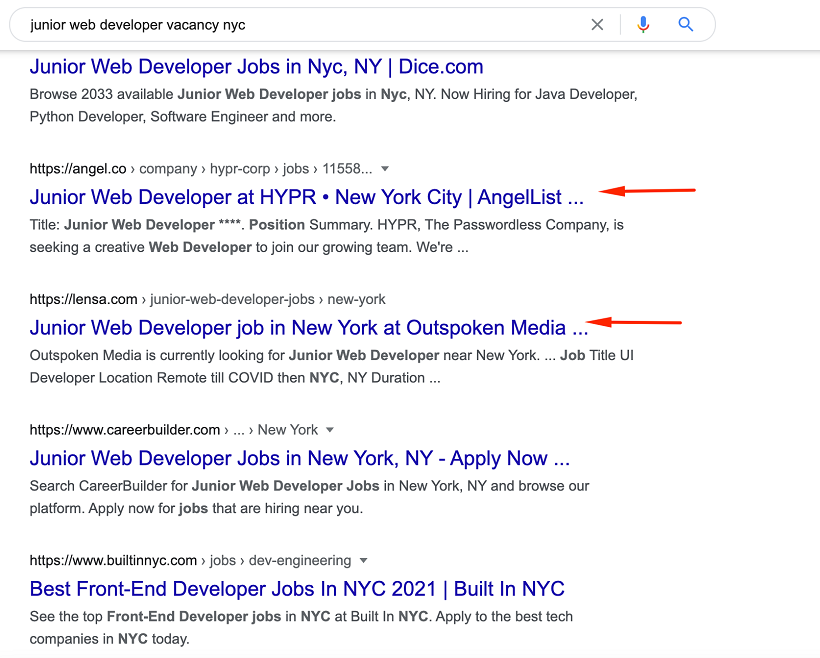Hiring is becoming an HR concern as the economies rise back after the pandemic. It is a top priority among HR professionals, with about half of employers planning to expand their staff in 2021.
Apart from typical activities like simply posting jobs on job boards or looking for potential candidates on LinkedIn, modern HR professionals might want to apply some basic SEO skills to help them find candidates faster.
How SEO can be beneficial for HR
SEO stands for search engine optimization. While traditionally considered a particular marketing specialty, some of its basic skills and understanding of how it works can help an HR professional carry out their recruiting tasks efficiently.
Wouldn’t it be great if an HR vacancy showed up on the first page of search results for the position in the required location? It might help enormously to drive the in-flow of quality candidates. Also, don’t forget that any job site, be it Indeed, Monster, or any other, uses either similar or exactly Google’s algorithms for vacancy searches within the website. Thus, trying to optimize your job postings for SEO will help you greatly to attract candidates faster.
Here are some of the basic steps for optimizing your vacancies on thematic websites.
1. Use keywords
Using specific keywords can take your vacancy page higher in the search results. It will make your offer visible for more job-seekers that simply google open vacancies like “web developer jobs.” So, your task is to find those keywords that potential candidates use for their searches.
To do that, you need to do keyword research – don’t worry, it’s not complicated since different tools make everything almost automatic. Plus, most of them have demo accounts, so you can understand how everything works for free.
One such tool is SE Ranking Keyword Research tool that helps analyze keywords, choose the best queries that will rank high, and examine the top search queries for every keyword you’ve chosen. To get the desired result, enter your “seed word” (in your case, it’s the job title) in this SEO software.
Keyword research will help you understand how people actually search for jobs. With a dedicated Keyword Research tool, you will see:
- The exact wordings people use when searching for similar jobs and the search volume for each of them. You can see whether people use words like “full-time” or “entry level” when searching for job openings.
- Whether people use local keywords, e.g., city, region, state, or a specific company name.
- Which similar keywords may be used when searching for the same jobs.
- Which specific keywords may be strongly relevant for this job. These are useful in case you are looking for a particular employee.
Understanding how candidates are using search engines to look for jobs is halfway to creating a super-relevant job opening post which nails it with search engines and brings in more eyes and clicks.
2. Mind ranking factors for the job title
There are many ranking factors affecting your vacancy page, but the most important one is the job title. The following advice will help you nail it:
- Exact job title: make sure it includes a precise title of the position, and especially – in the way regular people talk about it. You may have a fancy corporate culture where the office manager is called something like “Lead Enabler,” but that’s not the title people will search for when looking for job opportunities.
- Include relevant extra info: mention the type of the job you offer, whether it’s an internship, part-time, remote, full-time, etc. It will help the search engines pinpoint your open job post since many people add such details in the search, i.e., “web developer part-time.”
- Keep it short: as a rule, your job title is shown as the page title in the search results. So, it should consist of no more than 60 characters, be precise yet engaging.
- Include your brand name: some job-seekers may be looking for vacancies in a specific company, and that’s your chance to get noticed!
- Avoid anything not absolutely crucial for searching: anything like “committed to team culture” or “your new great opportunity” should be out of the title and make its way into the job description.
Also, use Google Trends to check the data on the volume for certain keyword searches to pick up the right wording for your job title. Since fewer workers respond to ads in the COVID era (20% decline), it will be useful to check on HR trends across various regions and languages to improve your chances to find the candidate faster. It may happen that the same job is trendy in one area and is not quite popular in another. For example, you may see that web developer jobs are surprisingly more interesting to Utah residents on the screenshot below. If you hire remote developers, you may consider paid advertising for precisely this state. That will reduce the cost per click in Google Ads and increase your chances of attracting job seekers who are actively interested in your job.
3. Create a unique job description
When you’re looking for a not-so-important role, you may be tempted just to copy a similar job description from a competitor and call it a day. Apart from ethical issues, it’s a big no-no in the SEO sense because search engines don’t like plagiarism and downrank such pages accordingly. You may glance at some ideas of how other HRs write their job descriptions but always aim for a unique job description. To check whether your job description is unique, you can use Copyscape or Grammarly.
One of the most important signals for search engines to rank a page up or down is the behavioral patterns of those who reach the page. If the search engines see that people close the page immediately, don’t read it or click on the “Apply for this job” button much less than on other similar pages, that’s a strong signal for a search engine that this page is less relevant so that they will downrank it for sure.
As reported in an Indeed survey, 52% of the candidates asked about the influence of the job description said that it was either very or extremely influential. The general advice is to try to make the job description interesting enough to read it, scroll through it, and be willing to apply. Let’s talk about it in more details:
- Describe the job in simple language, don’t talk in a typical corporate neutral tone. Normal human language creates empathy, while corporate talk instantly alienates, producing a higher bounce rate, possibly worsening the page rank.
- Provide relevant details of the job. Mention the core responsibilities, required skills, and personal traits. The better detailed and accurate your job description, the more the chance that people will stay longer reading it (lower bounce rate) and further interact with it (more user actions like clicking on the “Apply” button).
- Include salary details. People quit reading job postings way too much when they don’t see anything about the salary range. According to an Indeed survey, 25% of job seekers claim that salary and benefits are the most important part of the vacancy. Also, mind generous unemployment benefits during the pandemic that people now value more than finding a job with a regular salary. Therefore the higher salary rates in the job description will bring more chances to hunt a candidate.
- Avoid large walls of text which instantly make it too boring to read. Keep it at no more than 700 words and bullet-point the most important sections like skills required as Google ranks well-structured content higher.
- Use the keywords you’ve chosen throughout the text but do not overdo them. The average keyword density is around 2%.
- Let people know who you are and why it may be tempting to work for your company. 72% of job-seekers pay attention to company culture when reading a vacancy. Also, consider health and financial risks that people gained during the pandemic and became less likely to switch jobs. Therefore, relevant and useful job information will get more application clicks compared to others.
4. Mind local search
Aside from pandemic-induced shift to remote work, many people that provide in-person services (grocery store managers, drivers, nurses) are still looking for open job opportunities in a specific city or region. By adding geographic information to your job, you narrow your search and get applications from candidates who are directly interested in working for you. Here are some tips on how to use local search features in your job postings:
- Add the city or region to your vacancy title;
- In the job description, list the regions where you have offices;
- Use keywords such as “sales rep in New York” in the vacancy text – that is, with an accurate geographic reference;
- When creating a company profile on a job search website, indicate the cities you have representative offices.
5. Search in the right places
Google continues launching its feature called Google for Jobs around the globe that makes more HR specialists care about SEO techniques. The service pulls all the job postings relevant to a search and displays them on the search result page. It is a great help for any human resources manager as high-ranked job postings will attract more views and clicks from the candidates.
The catch is that you cannot post to it directly. It will automatically look for job postings that use the specific JobPosting schema for marking up data on the page. To add JobPosting schema markup to your company site, you’d need help from SEO specialists. As for the largest job sites where you usually post your vacancies, they all use it, so you don’t have to care about it there.
Also, there could be some job boards you just may not know about. Search for something like “best job boards 2021” + the job title of your vacancy in particular niche websites. Chances are you’ll find some lists of job boards for this profession, like the list of the Best Niche Job Boards for Web Designer Jobs, where you can apply to be included in this list. Be sure to differ from competitors’ job offers.
Summary
To get more quality applications on your job postings, you don’t need to be an experienced SEO specialist. The search for candidates becomes more competitive and complicated as the hiring market shifts so quickly in 2021. Thus experiment with SEO skills and smart tactics to stay afloat. SEO basics are one of such skills which HR specialists should utilize. Be original and describe your vacancy in detail in simple language with bullet points, and you’ll receive a stream of applications from relevant job-seekers.












Leave A Comment